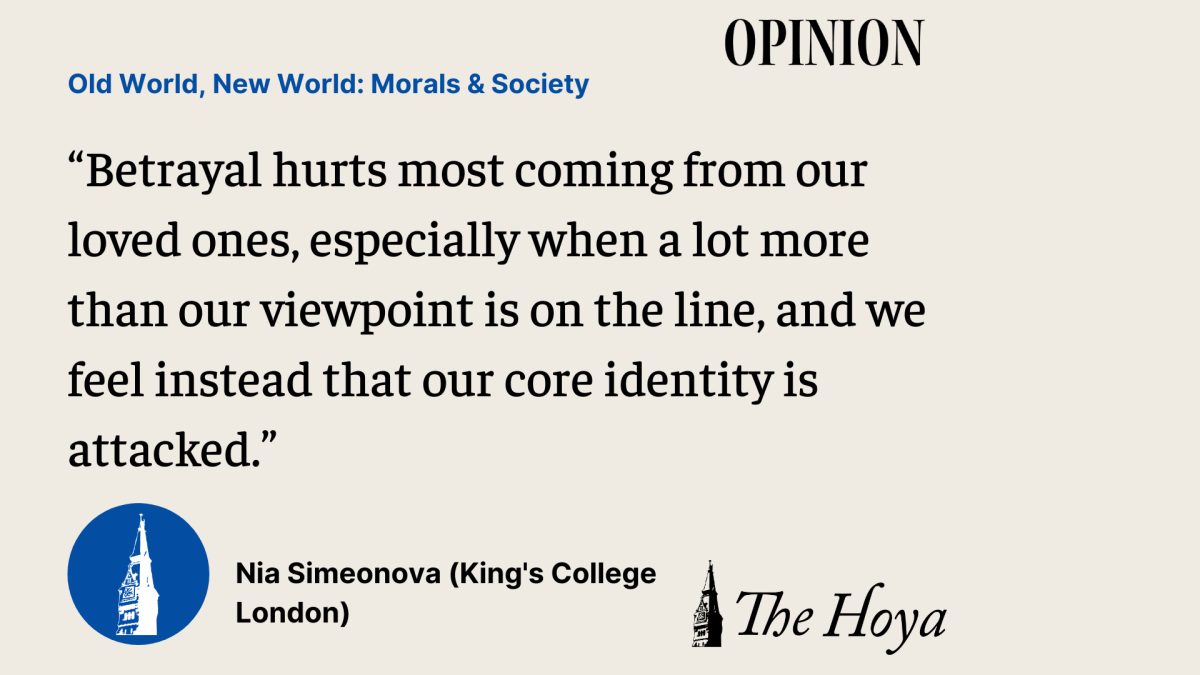I remember this vividly, as if it were yesterday: A woman in a red dress crying on a rowdy street corner in Central London, a hostile-looking man shouting at her. As my boyfriend and I — two scared 19-year-olds — prepared to intervene, the man shifted his attention to us. Addressing the woman, he asked: “Do you want to tell them why you’re crying, or should I?”
Turning to us with a bitter laugh, he answered his own question: “She just found out that her husband voted for Brexit! And now she’s crying on the street!” He was referring to himself. What we thought was a cruel and predatory street encounter turned out to be a dispute of a rather domestic nature.
I would bet my European Union (EU) passport that this was not the only family in the United Kingdom torn apart by differences in political opinion. Betrayal hurts most coming from our loved ones, especially when a lot more than our viewpoint is on the line and we feel instead that our core identity is attacked.
I wonder if my American readers can conceive such deep-rooted and painful societal division. I am, of course, joking. But more than three years after that street corner encounter, U.K. society is trying to move on and forget that Brexit ever happened. The United States, on the other hand, is bracing itself for another year of political turbulence. And while elements from its history and political structure make the United States unique, its problems are also uniquely complex.
Let’s start with what the United States shares with other countries. In 2016, polarization seemed to reign supreme — in a pair of hair-splitting public votes, Britons said “We’re out!” and decided to leave the EU, while Americans elected Donald Trump for president. Politically active urbanites were shocked by these outcomes, making it obvious that they had perhaps missed an important shift.
Georgetown professor Daniel Brumberg suggests in his “Political Polarization” class that, among other factors, we need to look at the United States and U.K.’s majoritarian electoral systems when attempting to understand polarization. In these electoral systems, rural voters enjoy disproportionately large representation.
Some European countries have found a solution: proportional representation. In this system, people vote for political parties instead of individuals. Ideally, those political parties get allocated exactly as many seats in a legislative body as the proportion of voters who support them. The historical fragmentation of culturally different groups that coinhabited a relatively small territory is one of the factors for adopting proportional representation. But there are good grounds for suggesting that this proportional system, which holds space for multiple parties, may be an important buffer for polarization.
Still, the EU has its issues. In contrast to the federal system in the United States, the EU is composed of 27 very different sovereign member states that have given up part of their sovereignty in order to belong to this larger collective body. Needless to say, the historical, political and cultural differences between EU member states create tensions. Many countries from the former Eastern bloc found it difficult to get even close to the economic and democratic results of Western European nations.
Immigration has proved to be one of the most convenient and highest-reward topics to abuse. In the United States, Trump tried just about anything — from travel bans to the infamous wall with Mexico. In the U.K., Brexiteers promised tougher control on immigrants — from boats crossing the English Channel to unwanted EU free-riders from Bulgaria and Romania.
No region or nation is ever safe from insidious conflict and disagreement. The question is, “What do we turn to as a society when things get bad?”
I remember when Queen Elizabeth II died in 2022 and Britons of all ages queued for days to say their farewell — perhaps to a person, but more likely to an era. For a moment, the tradition of monarchy provided a common ground for many Brits. The American equivalent would have to be the U.S. Constitution. The difference between the two traditions could be the topic of a whole other article. But does the social contract for free speech, political pluralism and open debate provide the same feeling of past comfort? Perhaps it does. Or, perhaps, it provides something else — the freedom to let go of tradition and start creating society anew.
Nia Simeonova is a student at King’s College London who’s studying on exchange at Georgetown this semester. This is the second installment of her column “Old World, New World.”




















